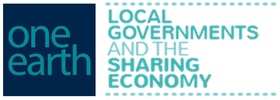What is the Sharing Economy?
The Sharing Economy involves a spectrum of actors – from individuals to nonprofit and for-profit entities – as well as those that are community and public sector based – that identify with Sharing Economy beliefs and traits in order to exchange a broad range of tangible and intangible assets.
There are different forms of exchange including bartering, sharing, renting, trading, borrowing, lending, leasing and swapping. Likewise, the Sharing Economy features a range of assets including goods, services, time, capital, experiences and space. The Sharing Economy aims to unlock the idling capacity found in the untapped social, economic, and environmental value of underutilized assets. It promotes access to goods instead of ownership in many, but not all, of its transactions.(1) There are a number of estimates of the current scale of the Sharing Economy:
Learn more...
We listed a range of sharing economy experts, networks, resources and reading materials in the report, with two examples here:
|
Watch the Webinar Recording here:
Rosemary Cooper and Vanessa Timmer from One Earth, the lead authors of the Roadmap, shared highlights from the report in a November webinar, with a discussion about the role that cities can play in aligning sharing economy activities with their own objectives, including moving towards sustainability. Collaborative Consumption and The Sharing Economy: Opportunities for Cities, Organizations and Wellbeing - a talk featuring April Rinne - LGSE project advisor and sharing economy expert - recorded in Vancouver, Canada
In her February 2014 talk, April Rinne, Chief Strategy Officer, Collaborative Lab illustrates how the collaborative economy (which includes "the sharing economy") has the potential to transform the way we design products and services, create sustainable and "shareable" cities, re-imagine public services, reduce waste and connect communities. April's visit to Canada was part of the launch of Cities for People, a Canada-wide initiative to create more resilient and livable cities. Her national speaking tour was co-sponsored by Social Innovation Generation (SiG) and Vancity. In Vancouver, April's visit was hosted by One Earth with The Sharing Project, Modo The Car Co-op, City of Vancouver, CityStudio, The HiVE, Board of Change, Village Vancouver, Share Shed, Pogoride, Ashoka, Extraenvironmentalist, BC Partners for Social Impact and other local partners.
|
Get involved...
You can join listservs, browse resources, find communities and share opportunities. Here are some listings:
Center for a New American Dream aims to improve wellbeing by inspiring and empowering all of us to shift the ways we consume. Here you can sign up for newsletters and browse videos, webinars, publications, blogs, and other resources. https://www.newdream.org
Collaborative Consumption focuses on the ways sharing is reinvented through technology. This site allows to you track upcoming events, use the job board, browse the service directory, and sign up for the latest e-newsletters. http://www.collaborativeconsumption.com
OuiShare’s mission is to build and nurture a collaborative society by connecting people, organizations and ideas. Here you can become a member, find jobs, access toolkits, join communities, find events, read the OuiShare magazine, and more. http://ouishare.net/en/
Peers aims to make the sharing economy work for the people who power it. Here you can become a member, find work, manage work, or get advice related to the sharing economy. http://www.peers.org
Shareable: The Sharing Cities Network connects local sharing activists in cities around the world for fun, mutual support, and movement building. Here you can join communities, collaborate, and access SCN Toolkits: http://www.shareable.net/sharing-cities
Center for a New American Dream aims to improve wellbeing by inspiring and empowering all of us to shift the ways we consume. Here you can sign up for newsletters and browse videos, webinars, publications, blogs, and other resources. https://www.newdream.org
Collaborative Consumption focuses on the ways sharing is reinvented through technology. This site allows to you track upcoming events, use the job board, browse the service directory, and sign up for the latest e-newsletters. http://www.collaborativeconsumption.com
OuiShare’s mission is to build and nurture a collaborative society by connecting people, organizations and ideas. Here you can become a member, find jobs, access toolkits, join communities, find events, read the OuiShare magazine, and more. http://ouishare.net/en/
Peers aims to make the sharing economy work for the people who power it. Here you can become a member, find work, manage work, or get advice related to the sharing economy. http://www.peers.org
Shareable: The Sharing Cities Network connects local sharing activists in cities around the world for fun, mutual support, and movement building. Here you can join communities, collaborate, and access SCN Toolkits: http://www.shareable.net/sharing-cities
References:
1. Resources: Rachel Botsman and Roo Rogers. What’s Mine Is Yours: The Rise of Collaborative Consumption. (New York: HarperCollins Publications, 2010).
Lisa Gansky. The Mesh: Why the Future of Business is Sharing. (New York: Penguin Press, 2010). AND Bryan Walsh. “The Sharing Project Bryan Walsh 10 Ideas That Will Change the World: Today’s Smart Choice: Don’t Own. Share.” Time Magazine, 17 March 2011. http://content.time.com/time/specials/packages/article/0,28804,2059521_2059717_2059710,00.html
2. http://www.theneweconomy.com/business/the-sharing-economy-shakes-up-traditional-business-models
3. Sadhu A. Johnston, Steven S. Nicholas and Julia Parzen. The Guide to Greening Cities (Washington DC: Island Press, 2013).
4. Rachel Botsman and Roo Rogers. What’s Mine Is Yours: The Rise of Collaborative Consumption. (New York: HarperCollins Publications, 2010).
1. Resources: Rachel Botsman and Roo Rogers. What’s Mine Is Yours: The Rise of Collaborative Consumption. (New York: HarperCollins Publications, 2010).
Lisa Gansky. The Mesh: Why the Future of Business is Sharing. (New York: Penguin Press, 2010). AND Bryan Walsh. “The Sharing Project Bryan Walsh 10 Ideas That Will Change the World: Today’s Smart Choice: Don’t Own. Share.” Time Magazine, 17 March 2011. http://content.time.com/time/specials/packages/article/0,28804,2059521_2059717_2059710,00.html
2. http://www.theneweconomy.com/business/the-sharing-economy-shakes-up-traditional-business-models
3. Sadhu A. Johnston, Steven S. Nicholas and Julia Parzen. The Guide to Greening Cities (Washington DC: Island Press, 2013).
4. Rachel Botsman and Roo Rogers. What’s Mine Is Yours: The Rise of Collaborative Consumption. (New York: HarperCollins Publications, 2010).
